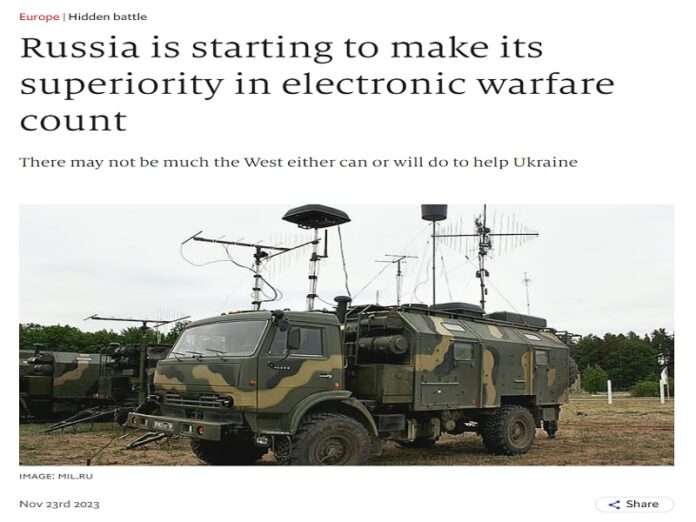The Economist published a piece last week about how “Russia is starting to make its superiority in electronic warfare count”, which contains some facts that most folks are likely unaware of. For instance, “Ukraine discovered in March that its Excalibur GPS-guided shells suddenly started going off-target, thanks to Russian jamming. Something similar started happening to the JDAM-ER guided bombs that America had supplied to the Ukrainian air force, while Ukraine’s HIMARS-launched GMLRS long-range rockets also started missing their targets. In some areas, a majority of GMLRS rounds now go astray.”
This particular disclosure proves that Russia has neutralized the high-tech armaments that Ukraine received from the West and which were previously spun by the Mainstream Media as “game-changers”. The Economist continued enlightening their readers by informing them that “(Ukrainian drone) losses to Russian EW, which either scrambles their guidance systems or jams their radio-control links with their operators, have at times been running at over 2,000 a week.”
Considering that each costs around $1,000 according to their report, this works out to Russia downing $2 million worth of Ukrainian drones every week, all of which were likely financed by the West. As a result, The Economist wrote that “The skies over the battlefield are now thick with Russian drones. Around Bakhmut, Ukrainian soldiers estimate that Russia is deploying twice the number of assault drones they are able to.”
That’s not all either since The Economist quoted two RUSI experts who told them that “The (EW) system (that Russia is employing) has a 10km range and can take over control of the drone, while acquiring the co-ordinates of the place from where it is being piloted, with an accuracy of one metre, for transmission to an artillery battery.” Each of Ukraine’s estimated 10,000 drone pilots that they mentioned in their report are therefore at risk of being killed shortly after launching their device into the battlefield.
They then wrapped up their piece by citing an American expert who confirmed that his country restricted the export of its EW equipment to Ukraine, which readers can surmise was done to prevent it from falling into Russia’s hands. Another expert from a German think tank flat-out told The Economist that “NATO’s capabilities may not be as good as Russia’s” and speculated that Russia could pass along “the frequencies and channel-hopping techniques employed” by such equipment to China.
For these reasons, the West is reluctant to strengthen Ukraine’s EW capabilities, which leaves Ukraine powerless to stop Russia from neutralizing the West’s high-tech armaments, destroying an estimated $2 million of drones a week, and deploying its own drone swarms against them. Amidst these lopsided conditions, there’s no realistic way that Ukraine can claw back any more territory, and they stand to lose even more the longer that the conflict continues. It’s little wonder then that the West wants to freeze it.
